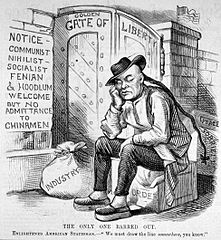To make any comment about the extent to which resources should be devoted to open borders advocacy, and the way the resources should be allocated, one must have at least some idea of how effective various forms of open borders advocacy are. One of the most admirable proponents of open borders is Bryan Caplan. Caplan has called open borders the most important issue of our time (here and here) and his writings are linked to and quoted all over this website. But just how effective is he? How many minds has he changed? How many hearts has he won to the cause of open borders? I emailed Caplan, asking him to post this question as a bleg to his commenters, a group that includes both a number of passionate pro-open borders people (like John Lee, whom I recruited to the Open Borders blog after discovering him in the EconLog comments) and some of the most articulate restrictionists of open borders, as Nathan has pointed out.
Caplan was kind enough to do an Open Borders Persuasion Bleg, and Nathan has since written a blog post responding to some of Caplan’s critics. My focus here is not to respond to the critiques of Caplan (a job that Nathan has already done, with the exception of taking on Ghost of Christmas Past). Rather, my goal is to do a quick quantitative and qualitative analysis of the comments, and then to use these to pontificate on the future direction and focus of open borders advocacy.
Quantitatively measured conclusions: some evidence of effectiveness
I have a quick summary of the responses here. For each commenter, I tried to identify the commenter’s stance on open borders pre-Caplan and post-Caplan. For commenters where the stance was unclear, I selected all possibilities that were consistent with the comment. Here’s what I took away from the analysis:
- About half the commenters (46/90 in my count) were influenced toward more open borders. 10/90 were influenced toward more closed borders, and the rest were either unaffected or their comments did not make it clear how they were affected. Note that my count of unaffected people includes people who were already so pro-open borders that their conviction couldn’t be strengthened further.
- The overall mix of commenters’ positions pre-Caplan and post-Caplan has changed to some extent to the pro-open borders position. Support for closed borders (i.e., more closed borders than the status quo) decreased, and support for radical open borders increased. There was a shift all along the chain from closed borders to the status quo to moderately more open borders to radically more open borders. The most dramatic shift, though, was the shift from moderately more open borders to radically more open borders. Caplan seems to be most convincing in this group.
- About 60% of the commenters (54/90 in my count) said, directly or indirectly, that Caplan had persuaded them about the importance of the issue. This includes some people who were already so radically pro-open borders that they couldn’t move further in that direction — Caplan influenced these people to attach a greater priority to open borders. It also includes people who aren’t completely convinced by Caplan, but think that this issue is important and deserves more attention, and appreciate Caplan’s efforts to address the issue.
- There were a bunch of people (16/90 in my count) who said that Caplan had successfully addressed some, but not all, of their concerns about open borders.
- Among the specific points where commenters considered Caplan unconvincing, political externalities was the most significant. Other issues raised by the commenters included IQ deficit, dysfunctional immigrant culture, and the welfare state/fiscal burden objection. Unsurprisingly for an economically literate group of commenters, the suppression of wages of natives issue was raised by almost no commenter.
Qualitative nature of complaints
The gist of the qualitative pushback that Caplan received from commenters was that he didn’t take restrictionist concerns seriously enough for them to be convinced that his advocacy of open borders had adequately taken these objections into account. Now, prima facie, this objection seems weird, because Caplan has spent more time than almost any other open borders advocate I know trying to address restrictionist arguments such as IQ deficit and political externalities (though I hope that the coverage of these topics on the Open Borders blog will soon outstrip Caplan’s coverage). He has been willing to consider keyhole solutions as an alternative to closed borders. Yet, commenters are not satisfied with Caplan’s efforts. Continue reading How persuasive are open borders advocates? The case of Bryan Caplan

